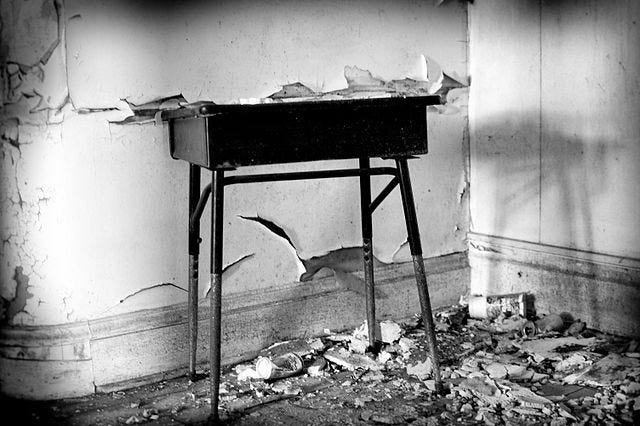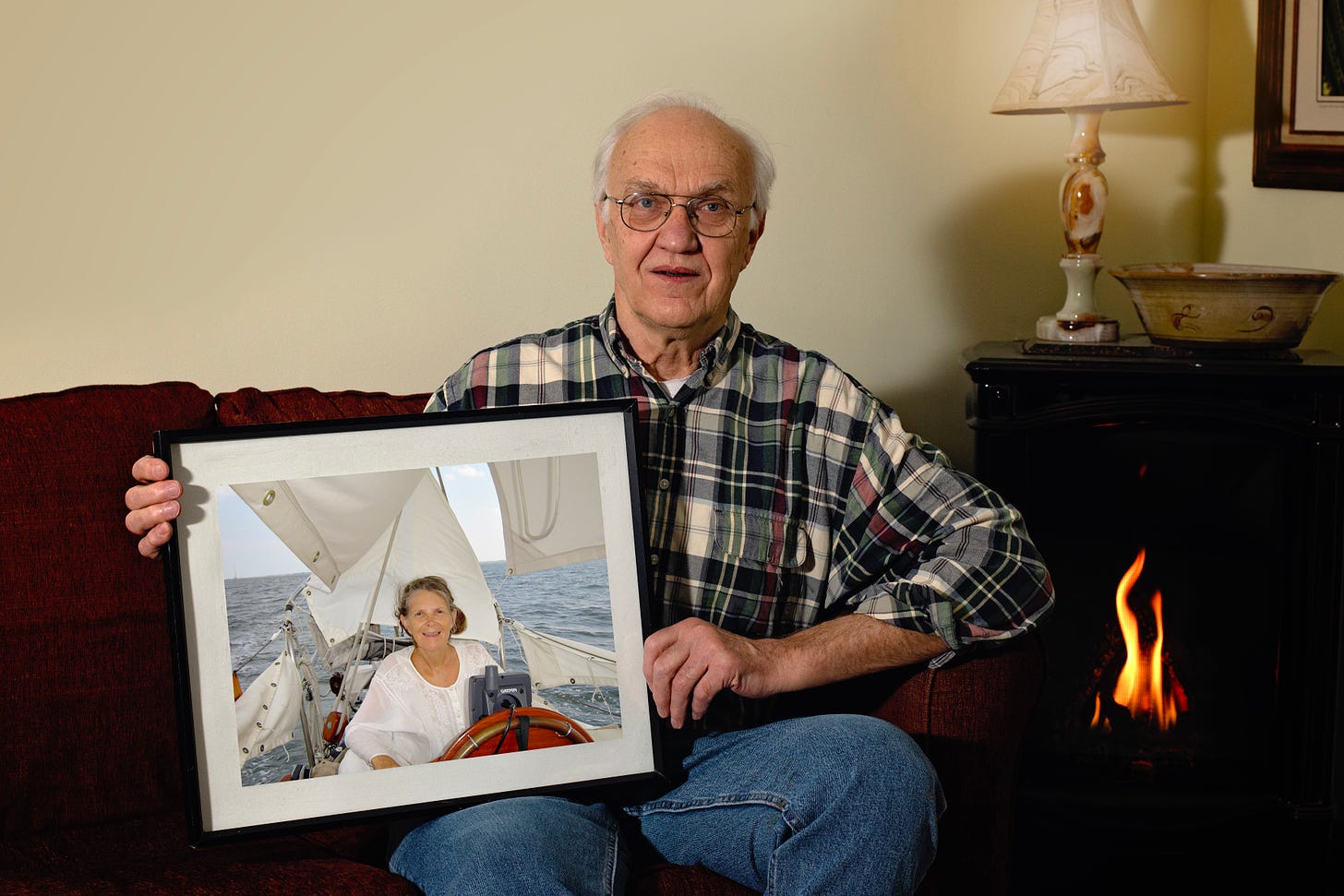When a Sexual Predator Met a Whistleblower
Remembering Karen Pietkiewicz, the Woman Who Unravelled the Ken DeLuca Affair
Note: This story contains descriptions of sexual harassment and violence.
My first job was delivering The Sault Star and Sault This Week.
I like to think that spending some of my early years thumbing through those pages sparked my interest in public affairs.
I delivered papers in the late 1990s and early 2000s, on a sleepy east-end street.
Little did I know that I passed by a sexual predator’s home almost every single day on my route.
It wasn’t until years later that I realized I was an unwitting (but admittedly small) piece of Sault Ste. Marie’s dark history.
I was likely delivering news reporting about Kenneth DeLuca to Kenneth DeLuca (and all the neighbours).
His criminal case is among the most controversial Sault Ste. Marie has ever seen.
Credit: Tiffany Bailey (Wikimedia Commons)
Between 1972 and 1993, DeLuca’s sexual predations spanned several schools in the former Roman Catholic District Separate School Board.
As a teacher, he sexually harassed and assaulted several of his female students.
His youngest victim was reportedly 10 years old.
Although DeLuca abused for two decades with near impunity, his behaviour wasn’t exactly a secret.
Complaints had been made and well-founded rumours swirled throughout his career.
Many of those who came forward with complaints felt intimidated by responses from Board officials and local police.
In 1994, DeLuca was criminally charged with 42 offences.
Two years later, he was convicted of 14 of them in a plea deal with the Crown, including several counts of indecent assault and sexual assault, and one count of counselling a young person to touch for a sexual purpose.
Although the absence of a criminal trial spared his victims what could be an excruciating courtroom experience, it also meant the details of Deluca’s depravity were mostly shielded from public view.
The traumas he inflicted were subsequently broadcast to the entire country, featured in a 1997 episode of CBC’s The Fifth Estate. The program described the DeLuca affair as a “cover up… with the help of the police.”
DeLuca was sentenced to 40 months in a federal institution and granted statutory release in 1998, after completing two-thirds of his sentence.
While incarcerated, he was no model prisoner.
His supervised excursion privileges were eventually revoked, and he was turfed from the institution’s programming offered to sex offenders.
Several lawsuits were launched by victims and eventually settled, and the Board offered a formal apology, which read in part: “[N]o financial recompense can ever make up for the trauma and humiliation which these women have endured.”
The DeLuca affair proved a catalyst for government action, aided in part by several requests for an official inquiry into the Board’s systemic failures.
In 1999, a retired Ontario Court of Appeal judge, the Honourable Sydney L. Robins, was tasked with a government review, and released a report the following year.
While the scope and mandate of the review fell short of what some victims and the Board itself demanded, it nonetheless “examine[d] the issues raised by the DeLuca case and the lessons to be learned from it.”
The Robins Report, as it came to be known, “conclude[d] that the response of the School Board and its employees to complaints or disclosures made by the victims was completely inadequate and, indeed, harmful.”
It also depicted some of the sexual abuse endured by his students:
The abuse reported by DeLuca’s survivors included kissing students; inserting his tongue into students’ mouths; rubbing his body against the students; touching or rubbing students’ breasts; having a student hold his penis while class was in session; lying on top of students and rubbing his body against theirs; touching students’ genitals; rubbing his pelvis against students; biting a student’s chest and vagina through her clothes; and intercourse (with one student). The adult survivor disclosed that DeLuca grabbed her and, with his knees splayed, pulled her tight into his body while he made rutting noises with his pelvis against her private parts.
Its findings were blunt: “[T]he educational system had failed [DeLuca’s] victims.”
It also argued that neither the DeLuca affair, nor the institutional culture that enabled his crimes, were “unique.”
Although DeLuca’s behaviour was shocking and extreme, students endured sexual abuse across Ontario’s school systems.
A suite of regulatory changes ensued, including greater accountability and transparency mechanisms to prevent such abuses.
Because DeLuca relied upon intimidation tactics and the cowardice of his coworkers and superiors, his downfall was triggered when he met someone he couldn’t bully into silence.
Her name is Karen Pietkiewicz, a Board administrator turned whistleblower.
While much is known about the villain of the DeLuca affair, relatively less is known about the hero.
Henry Pietkiewicz Holding a Photo of Karen (Credit: Tammy Fiegehen)
In an exclusive interview, Pietkiewicz’s surviving husband, Henry Pietkiewicz, reflected upon his late wife’s battle for accountability and shared details about how her life unfolded after the DeLuca affair.
At the time, Karen was responsible for the Board’s night school program as an administrator. Its programming began on a small scale, and Karen’s work included gradually expanding its operations with additional course offerings. Its growth was something satisfying for Karen because “she put her heart and soul into it,” as Henry explains.
Karen had heard rumours about DeLuca previously, but things changed when she was approached by a distressed mother of one of his victims.
Henry remembers the mother telling Karen that what was happening “isn’t right,” and wanted someone to finally address the appalling situation.
Because of Karen’s personality, “she stepped forward and went at it,” says Henry.
As she was quoted in The Fifth Estate episode, her response was: “I want him out of there.”
Karen raised the issue within the Board and a meeting was arranged.
Before the meeting, she was asked by Board officials to meet with DeLuca in his office to receive his resignation.
Instead, DeLuca intimidated and sexually harassed her.
She told the The Fifth Estate that the ordeal was jarring and made her think: “If he’ll do this to me, what is he doing to the kids?”
DeLuca didn’t teach at the night school anymore, but he continued at St. Mary’s during the day.
Sensing that the Board was content with inaction, Karen gathered relevant information on her own to hand over to police.
A formal criminal investigation was launched in 1993.
When details of the affair spilled out into the public record, the Board was keen to salvage its reputation in the eyes of the community.
Following DeLuca’s arrest, Pietkiewicz told reporters that she previously brought complaints about DeLuca to the Board and called for a formal inquiry.
She was then the target of a defamation lawsuit from the Board.
She responded in kind when then Education Director, Bill Struk, told reporters months later that Karen had made “unsubstantiated allegations” about the history of internal complaints.
Henry describes his late wife as “a pretty smart lady,” someone that easily “talked rings around those lawyers.”
He says their family home was their life’s equity, and Karen worried that such legal entanglements might jeopardize that. He didn’t think it “was a concrete possibility,” but it was Karen’s nature to be worried about negative consequences.
Her greatest fear was realized when she lost her defamation case against the Board.
According to Henry, she was “devastated” and “really took it hard.”
With some persistence, however, she won the right to appeal.
As time wore on, the affair had completely unravelled, and the shortcomings of the Board became more apparent.
The lawsuits were eventually put to rest with an undisclosed settlement.
Henry sees a certain sense of irony in the Board’s response to Karen.
While it’s easy to appreciate that its “good name was being slandered” from its own point of view, the attempted silencing of Karen eventually backfired.
A “stupid concept,” he says, because the gravity of DeLuca’s crimes meant they couldn’t be so easily kept from public view.
Relieved by the resolution, Karen then “washed her hands of it” and didn’t care to closely follow what happened next. Curiously, Henry is unaware of the Ontario government’s review and the Robins Report that closely followed.
Oversight in the field of teaching may have measurably improved over time, but Henry says cases like Deluca’s are still an unfortunate reality.
It’s also the case that public and private institutions zealously guard their reputation, making the prospects of whistleblowing daunting and dangerous.
“The system wants to protect itself… they want to cover their own ass,” he explains.
But Karen was undeterred all along.
Henry says she meticulously kept a volume of records, including notes of all her communications with Board officials about DeLuca, an effort that predated the widespread use of computers. It was clear to Henry that “nothing escaped her” and her intelligence and tenacity put the wind at her back.
In the wake of the affair, the two of them finally fulfilled their life dream of sailing out of town.
Henry had built a 38-foot steel sailboat in their backyard, and they lived on it for more than a decade.
Together, they explored a vast expanse of the eastern coastline of the United States and traveled as far south as Grenada. Henry says that Karen “loved living on the boat, and she would have stayed there forever.”
In the mid-2000s, however, she started exhibiting symptoms of Alzheimer’s.
The long process that followed was “heartbreaking” and “misery the whole time,” according to Henry.
In 2008, they bought a home in Pittsburgh, where Karen eventually died, and Henry now resides.
Henry cared for Karen during the last few years of her life.
He says she “despised doctors and nursing homes” and would have been “absolutely miserable” in an institutional setting. Therefore, he “didn’t give it much thought” and simply “took care of what was directly in front of [him].”
She died in 2013.
In reflecting upon Karen’s life, Henry says the Deluca affair “was the major facet.”
Her whistleblowing reflected an unshakeable commitment to justice prevailing.
“When she perceived a threat, that was all consuming,” says Henry.
Nonetheless, the affair “disrupted [their] lives tremendously.”
The disruption paled in comparison to what Deluca’s victims endured and, in the end, “she felt vindicated that justice prevailed.”
In particular, she thought it was vital that his victims “didn’t feel abandoned” and was heartened by the community’s support for her and them, even if the latter’s suffering was preventable.
Although the end of her life was marked by deteriorating health and associated challenges, he says “she was pleased that she did right thing.”
Postscript
This story relied in part on previous local reporting from Elaine Della-Mattia and Linda Richardson, in addition to the Robins Report. During my research, I also searched for publicly accessible criminal case records at the Sault Ste. Marie courthouse.
To my surprise, they are apparently missing.
According to the Sault courthouse, their records associated with R. v. DeLuca were sent to the Archives of Ontario (in Toronto) in 2017. However, the Archives cannot locate the records, and neither the Sault courthouse nor the Archives can explain where they’ve gone.
The Sault Crown Attorney office confirmed that they have their own prosecution files but denied a freedom of information request for them.
A subsequent request has been filed with the Ontario Ministry of the Attorney General for the agreed upon statement of facts and exhibit list.
Given the high-profile and importance of the case, it seems unconscionable that these records could simply disappear.
Stay tuned for more updates as I try to track them down.




